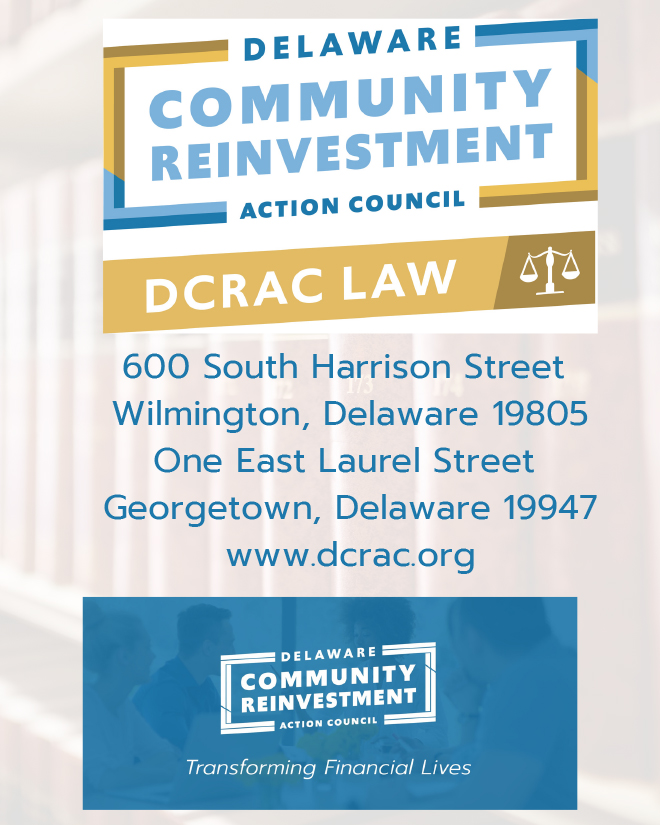Why Every Parent Needs An Estate Plan Now

By Jaclyn Quinn, Esq.
Delaware Community Reinvestment Action Council, Inc.
Whether you’re just starting a family or are navigating the teenage years, having an estate plan isn’t just for the wealthy or the elderly— it’s a crucial step for every parent or guardian aiming to safeguard their children’s future.
Here’s why:
1. Managing financial affairs
A comprehensive estate plan includes a will and financial documents, such as power of attorney and medical directives. These documents empower trusted individuals, called your “Agents,” to make financial and medical decisions on your behalf if you become incapacitated or pass away—designations that can prevent unnecessary stress during difficult times and ensure your wishes are honored. Completing these documents can often be straightforward, and the process often prompts necessary family discussions. Difficult medical and financial decisions frame life support and end of life wishes to asset management.
2. Ensuring your children’s care
Who will take care of your children in the event of their parents’ untimely passing? It’s a horrible future to contemplate, but it’s your responsibility as a caregiver to determine an answer. By designating a guardian in your will—a document central to any estate plan—you can ensure your children are raised by someone you choose, whom you trust and who shares your values. Your will should also appoint a trustee to manage money or assets on behalf of minors, depending on your children’s ages. Without such designations in place, these decisions and your children’s care fall to the courts.
3. Securing your children’s financial future
Estate planning isn’t just about guardianship; it often also involves establishing trusts or other financial tools to support your children’s future. Your money cannot legally be distributed directly to a minor, so these mechanisms are essential. By setting these up, you can also plan carefully for their education, healthcare, and other needs, ensuring that your wishes are carried out and your children’s financial well-being is safeguarded. Additionally, naming a trustee to handle the financial aspect of your children’s care ensures the court will not need to oversee the funds.
4. Protecting your assets
From your home to your savings to your possessions, all of your assets will be distributed after you’re gone—so planning in advance helps prevent family disputes and ensures things go according to your wishes. An important part of planning is to understand tax implications so you can make informed decisions about transfers and understand possible tax ramifications of certain actions. Ensuring beneficiary designations are in place is especially necessary when you have minor children, as failing to prepare in this area can prevent your child from accessing needed funds.
5. Minimizing family conflict
Without an estate plan in place, conflict may be inevitable as family members may face legal and emotional battles over distributing assets and caring for children without any direction from you. Clear directives laid out in your estate plan can minimize disputes, provide a roadmap for your loved ones—as well as legal representatives—and make a challenging period a bit easier and simpler to navigate for everyone. Start these conversations now, too, if you can; the people you’re considering naming in your documents should know what you might expect of them.
6. Peace of mind
No matter where life takes you and your family, having an estate plan in place provides peace of mind. Knowing that your wishes will be carried out and your children cared for can be incredibly reassuring and allows you to focus on time with your loved ones.
Estate planning is a proactive step every parent—and adult—should take to protect their family. By addressing these critical aspects now, you ensure that your family is cared for, your assets are managed, and your wishes are respected. It’s not just planning for the end of life—it’s safeguarding the futures of those you love most.
If you need legal advice, Jaclyn Quinn and her colleagues at the Delaware Community Reinvestment Action Council are available to assist with estate planning, including updating an existing plan. For more information, or to schedule a consultation, please call (302) 298-3251 or email [email protected]. For more information, visit www.dcrac.org.
If you need legal advice, Jaclyn Quinn and her colleagues at the Delaware Community Reinvestment Action Council are available to assist with estate planning, including updating an existing plan. For more information, or to schedule a consultation, please call (302) 298-3251 or email [email protected]. For more information, visit www.dcrac.org.
Bio
Jaclyn Quinn, Esq. joined the Delaware Community Reinvestment Action Council (DCRAC) in 2011, first as a volunteer, then as staff. In 2014 Jaclyn opened and grew her private practice until 2019, when DCRAC Law opened to the community. DCRAC Law is a nonprofit law firm providing tax, title, and other legal services to those unable to pay market rates.
Jaclyn graduated with a B.A. in Political Science from The College of New Jersey before moving to Delaware to pursue her J.D. at Widener University- Delaware Law School. She was admitted to the Delaware Bar in 2012, and is also barred in U.S. Tax Court and U.S. Immigration Court. She has volunteered with the Office of the Child Advocate, DVLS, and assists as pro bono counsel in a variety of cases.
Jaclyn Quinn, Esq. Delaware Community Reinvestment Action Council (DCRAC)
302-298-3251 [email protected] www.dcrac.org
@dcracdelcra on instagram & @DCRACDelCRA on facebook
600 South Harrison Street, Wilmington, Delaware
One East Laurel Street, Georgetown, Delaware


